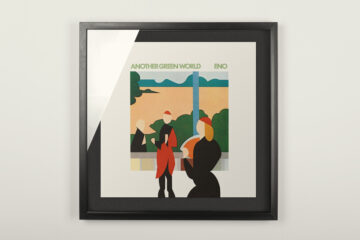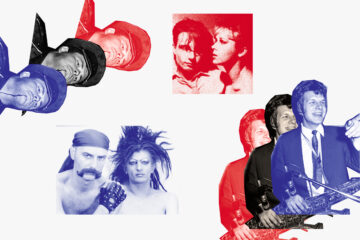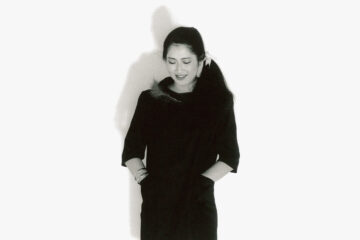UK rave culture is hurtling towards the sofa at the speed of two Mitsubishis. It’s 1993. A year earlier, the Fantazia label had thrown six parties and then pulled out of the business, just before the Criminal Justice and Public Order Act 1994 put a legal end to the open-air fun. Instead, records from Warp’s Artificial Intelligence series rotated through the living room smoke and shoegaze and Britpop divided up the Sensitives and the Lads. In 1993, there are still one or two years to go before the peak in jungle or the trip hop breakthrough. The next dead end seems to have been reached, a gap needs to be filled.

Debut
And it will be too. The best British dance album of the year is a pop record written by an Icelandic woman. »Debut« is the name Björk gives the album she releases on 05/07/1993 and of course although the title is a nice, it is nevertheless somehow still quite a bold-faced lie. However, she couldn’t have expressed a greater truth with the title either.
Precocious prodigy
But let’s start from the beginning, just very briefly: Björk Guðmundsdóttir was born in November 1965. After her parents separated, her mother raised her in a commune and she recorded her first album at the age of eleven. Then she discovers punk and records the single »Birthday« in 1987 with the Sugarcubes from the scene surrounding the art group Smekkleysa. The single is sponsored by John Peel in the UK, and inevitably becomes an underground hit as a result and lays the foundation for a successful but short band career.
Björk had already arrived in the UK with her band Tappi Tíkarrass, and that literally: in 1983, the post-punk quartet played some concerts as the support band to the legendary anarcho-punks Crass. Tours by the Sugarcubes drew her back there again, and in 1988 she finally made it to the right place at the right time: Manchester. Sorry, I mean, Madchester.
Björk is a genius, Björk is a fragile soul, Björk is a revolutionary, Björk already had a website when for everyone else, sending a fax was simply too crass.
Björk commutes between the city’s clubs and the clubs in London, finally moving from one island to the other in 1992 and following the Sugarcubes split, ultimately releasing »Debut«, an album that above all draws a line under the past. For one thing, between her own pursuit as a solo songwriter, writing tracks like »Human Behaviour« at the age of 17 and honing music with a minimal studio set-up by way of compensation, long after her son was in bed.
But also, under the tradition of British rave music that always preferred muddy fields on the outskirts of the London catchment area to the sofa at home and now has to make its bed in it. »Debut« turns out to be a surprise success. Instead of the 40,000 copies targeted, her record company managed to sell well over ten times as many. But how was that actually? And why does the mixture of rave, precious jazz arrangements, Bollywood strings and proto-trip-hop still manage not sound totally embarrassing a quarter of a century later?
The improbable world star
Björk only rose to unlikely world stardom because she is perhaps one of the last traditional pop star personas. The tenor that still accompanies her: Björk is a genius, Björk is a fragile soul, Björk is a revolutionary, Björk already had a website when for everyone else, sending a fax was simply too crass. Dude, Björk is an Ice-lan-der. That make everything clear. But is everything really clear?
Not quite, and that’s the beauty of it. Björk’s debut album, aptly named »Debut«, marked the first public appearance of a figure who seems radically intimate and extroverted in equal measure, but who never really reveals much about herself, and can also box the ears of someone who gets too close to her. Instead, Björk first lets lots of things flow together into one. Featuring Soul II Soul producer Nellee Hooper, whose signature can be heard on house-meets-hook-magic bangers like »Big Time Sensuality«, jazz harpist Corky Hale, who first reluctantly agreed to perform her interpretation of the jazz staple »Like Someone In Love«, saxophonist Oliver Lake, who plays on »Aeroplane« and »The Anchor Song«, and an Indian film orchestra responsible for the Bollywood sounds on »Venus As A Boy« as well as the tablas on »Come To Me«, the Icelander brings a wide spectrum of people and, above all, musical styles together.
This obviously worked out so well that a single criticism of their world music approach has not been voiced until today. Most probably because it works as pop in spite of everything. »Debut« offers a cohesive image of the artist, as well as a musical openness that was yet unknown in the still cautious coexistence of tradition and the present, rave and pop.
Radically intimate and extroverted at the same time
Just as Björk’s music on »Debut« is primarily to be understood in terms of its musical references, her lyrics are predominantly devoted to relationships. »Big Time Sensuality« is addressed to Hooper, »Venus As A Boy« is a study of a tender masculinity (»My generation of men were told to stifle [their feelings] for 20 years and then they got yelled at by women, because where were they?« she recapped as recently as 2017 in an interview about her album »Utopia«) and »There’s More To Life Than This« was sung in the toilet at the London Milk Bar club, background shrieks included. The Björk of »Debut«, just like the later Björk, only exists in relation to other people, both in the studio and in her lyrics, yet she seems to offer so much that is all-too-human in her lyrics.
Behind this, however, the débutante remains wonderfully vague as a person. And this in a time primarily characterised by quaint authenticity from the grunge business, the brash irony of Britpop lads and the euphoria of rave culture that is still brightly coloured, but has coagulated into an exhausted gesture. Björk unveils a musical and thematic frame of reference that serves as a canvas for the briefly sketched out love stories somewhere between happiness, desire and loss of control, best expressed in the feverish Ibiza sideways play of »Violently Happy«. But who actually loves whom and why is never quite clear and therefore all the better, because it sounds pretty unhealthy.
»Debut« is one of the few albums whose absolute present draws equally from the past – from X-Ray Spex to the Stone Roses to the latest acid house white label – as from the future. At the same time, it is a clairvoyant album that predicts the triumph of electronic pop music. It rarely sounded as wonderfully whimsical as it did on »Debut« in 1993, but that’s also why the title is a lie: Björk was way ahead of herself again.









